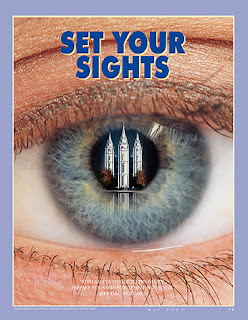The first phrase of Job 31:1 is very interesting. It says: I made a covenant with mine eyes; . . .
We all know that a covenant is a sacred agreement between God and a person or group of people. God sets specific conditions, and He promises to bless us as we obey those conditions. When we choose not to keep covenants, we cannot receive the blessings, and in some instances we suffer a penalty as a consequence of our disobedience.
So, how do we make a covenant with our eyes? Are you really making a covenant with your eyes, or are you making a covenant with God about what you will do with your eyes? There are multiple times in the scriptures where the Lord addresses this topic of wandering eyes. Here are just a few.
23 And he that looketh upon a woman to lust after her shall deny the faith, and shall not have the Spirit; and if he repents not he shall be cast out. (D&C 42:23)
16 And verily I say unto you, as I have said before, he that looketh on a woman to lust after her, or if any shall commit adultery in their hearts, they shall not have the Spirit, but shall deny the faith and shall fear. (D&C 63:16)
28 But I say unto you, that whosoever looketh on a woman, to lust after her, hath committed adultery already in his heart. (3 Nephi 12:28, see also Matthew 5:28)
The story of David and Bathsheba provides an excellent example of what can happen if we don’t honor the covenant we have made with our eyes. I have italicized a few words to point out the progression David went through on his path to sin. At any point he could have turned back and kept his covenants. We progress down the same path when we don’t honor our covenant by turning away when we first are tempted.
1 And it came to pass, after the year was expired, at the time when kings go forth to battle, that David sent Joab, and his servants with him, and all Israel; and they destroyed the children of Ammon, and besieged Rabbah. But David tarried still at Jerusalem.
2 ¶ And it came to pass in an eveningtide, that David arose from off his bed, and walked upon the roof of the king’s house: and from the roof he saw a woman washing herself; and the woman was very beautiful to look upon.
3 And David sent and inquired after the woman. And one said, Is not this Bath-sheba, the daughter of Eliam, the wife of Uriah the Hittite?
4 And David sent messengers, and took her; and she came in unto him, and he lay with her; for she was purified from her uncleanness: and she returned unto her house. (2 Samuel 11:1-5)
Here are the key points:
- David was supported to be someplace else. It was the time for kings to go forth to battle and David was the king. Always be in the right place doing the right thing.
- David saw the woman washing herself. Every man and young man will see things throughout the day that have the potential to damage his spirit. It is nearly impossible to avoid seeing things that could damage your spirit. The key lies in what you do next. If you immediately honor the covenant you have made with your eyes and look away, then you are moving to safer ground.
- David didn’t look away and move on, he continued to look long after he saw. This is were the problems really start. We need to train ourselves to look away.
- David may have been fine if he had lingered, but the lingering generally leads to action. His action was to inquire about her and finally send for her. We do something similar when we linger on web sites and then continue to click through to find more and more salacious material.
Elder Oaks gave us this advice. “. . .do all that you can to avoid pornography. If you ever find yourself in its presence—which can happen to anyone in the world in which we live—follow the example of Joseph of Egypt. When temptation caught him in her grip, he left temptation and “got him out” (Gen. 39:12). (Dallin H. Oaks, “Pornography”, April 2005 LDS General Conference)
If we will honor the covenant we have made with our eyes, then we avoid the traps, pitfalls, and dangers that come by progressing farther down the path that eventually leads to unhappiness, sin, and regret.

